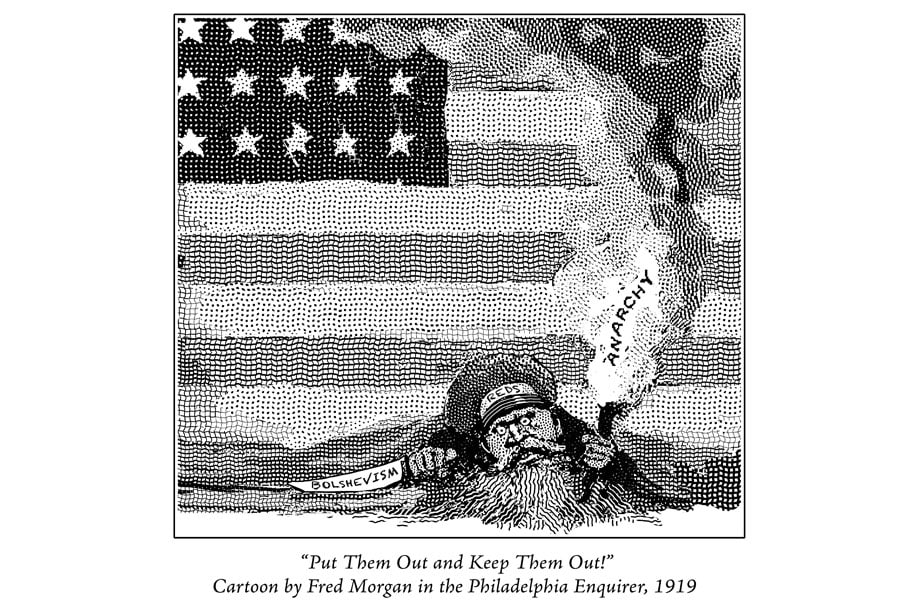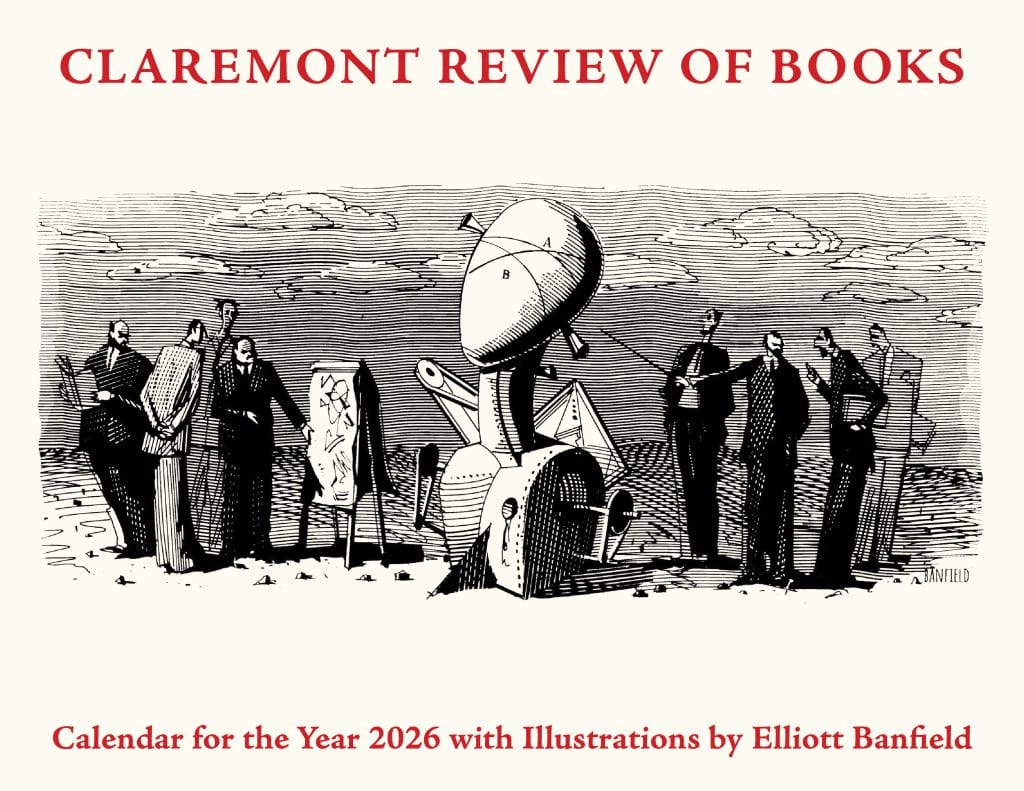Books Reviewed
Thoughtful books can be instructive even when wrong. These recent books tell us something about our current challenges, though they’re not even thoughtful.
Threat of Dissent is the more scholarly and the more readable of the two. Julia Rose Kraut, a lawyer and historian, has gathered up a lot of stories about how U.S. immigration law has been used to deport unwelcome aliens or stop them from ever entering the United States in the first place. Her particular political focus is “ideological exclusion” in different eras, so the book is a sort of scrapbook of ideological anxieties over the course of American history.
She begins in the 1790s with fears of agitators from Revolutionary France. A certain kind of conservative will be grateful for the inclusion of this observation by President John Adams, when telling his secretary of state to deny passports to a delegation of French “philosophers”: “We have had too many French philosophers already and I really begin to…suspect, that learned academies, not under immediate inspection and control of government, have disorganized the world, and are incompatible with social order.”
* * *
Kraut invites readers to be indignant about such intolerance. Successive chapters tell about anxieties over anarchists, after the anarchist-inspired assassinations of Presidents James Garfield and William McKinley; then Bolsheviks, who initially appeared to Americans as better-organized anarchists; then the menace of Stalinist Communism, engorged by the conquests of the Red Army; ending with concerns about Islamist terrorism, starting (as she reminds us) in the 1990s and then greatly amplified after the 9/11 attacks in 2001.
Among other interesting facts we learn: while the ACLU had a public purge of Communist Party members on its Board in 1940, the American Committee for the Protection of Foreign Born continued to embrace Communist members—which Kraut reports as if it were proof of the latter’s greater integrity. It doesn’t seem to occur to her to question the sincerity of people who claimed to be concerned about mistreatment of foreigners in America, while embracing the Soviet dictatorship as it pursued ethnic cleansing of millions of non-Russians in Soviet-controlled territory.
The book acknowledges, in its last few pages, that the number of people deported from (or barred entry to) the U.S. for ideological reasons was relatively small, across all eras. Between 1900 and 1961, for example, fewer than 1,500 foreigners were barred or deported as “subversive or anarchistic” (compared with about half a million excluded and about that number expelled for all other reasons). We might infer from these numbers that American authorities applied the relevant laws with suitable caution. That is not how Kraut sees it, however, protesting not only the “embarrassment and humiliation caused by the enforcement of ideological restrictions” but the “chilling effect on expressions of dissent” by foreigners not directly targeted, as well as the damage done “to the identity of the United States as a liberal democracy and to its image and reputation abroad.”
She never once pauses to ask whether “ideological exclusion” is unique to the United States (it is not), let alone why other countries sometimes think it is a good idea. Nor does she wonder whether some ideologies or organizations might be so foul, we’d be better off without them. That nice Mr. Trotsky? Why did he have to go all the way to Mexico? Should we have allowed the German-American Bund to import Hitler enthusiasts from the Reich before the war? Should we have exerted no control on those seeking to host Islamist preachers from the al-Qaeda terror networks?
Yes, the First Amendment protects advocacy for a wide range of opinions—for American citizens acting inside our country. Do we have the same obligation to foreigners who want to come here and spread dangerous or demoralizing doctrines? Perhaps it would be safer not to trust the government to make such fine distinctions, perhaps wiser to project more self-confidence to the outside world. Kraut does not seem to recognize that it is necessary to spell out and defend such arguments.
Threat of Dissent ends with a scolding of President Trump for returning to previous eras of exclusion (after a majority of the Supreme Court in Trump v. Hawaii [2018] agreed that existing law leaves broad discretion to the executive when it comes to excluding dangerous aliens). The author takes it for granted this episode is a stain on America—all the more so, in her telling, because it revives a tradition that goes back to the founding.
* * *
If Julia Kraut seems to deny the constitutional difference between citizens and aliens, Tracy Strong’s Learning One’s Native Tongue insists we need to give more meaning to “citizenship” and civic “participation.” A professor of political theory at U.C. San Diego for many decades, Strong might be expected to offer a different perspective from a legal historian’s. Yet, he ends up with the same conclusion: finger-wagging at the president and his supporters. Of course, disdain for rival views is not disqualifying (as a claim to scholarship), but here again the author doesn’t even notice that his own views might need some defending—or even cogent exposition.
The book starts by quoting a dozen lines from Plato’s Apology and Crito in the original Greek, though the references get less and less imposing as it proceeds. Soon enough, court cases and other texts are referenced to online sites where the author (or some hapless research assistant) happened to find them, as when a quote from Eugene Debs is credited to a Howard Zinn article found online in the archives of the Socialist Worker. I was exasperated by a purported Theodore Roosevelt quote, with accompanying footnote to a website called “A-Z Quotes” which does not itself provide a source for the supposed T.R. statement. Eventually, we hear about “the Japanese attack on Pearl Harbor,” which this book dates to “December 6, 1941”—the real date not having lived so long in infamy, after all.
But it is the substantive argument that is most slipshod. Strong praises the Puritan settlers of Massachusetts for seeking “some quality of responsibility and seriousness” in citizenship and then hustles along to praise James Madison for endorsing property ownership as a qualification for voting: “as with church membership [in earlier times], the primary concern [of property requirements] is that citizens behave as (good) citizens should and not give in to the temptations of corruption…to act in the common good and not in [the citizen’s] narrow individual interest.” All that discussion in The Federalist about the prevalence of self-interested “faction” in republics? Apparently, Strong could not find a web link.
* * *
He is so entranced with communal identification that he complains that abolitionists before the Civil War were “fundamentally nonpolitical” because they associated freedom with personal self-ownership. So after the Civil War, the abolition of slavery tended “to legitimate a vision of citizenship completely compatible with the wage-labor-based economy that was becoming increasingly dominant in the North.” From there, we hear a lot about the attractions of socialist alternatives. Over half the book is devoted to reveries on this subject.
He quotes Lenin’s assurance that under socialism, “there must be neither rich nor poor” and “improvements must serve to ease the work of all.” Such “thoughts…would be appealing and familiar,” Strong insists, “[i]f one was not of the elite in America.” So he proceeds to devote many pages to claims that the Communist Party had much more influence than its small membership might suggest. Then he quotes the Communist Political Association charter of 1944, heralding the advent of this “non-party organization of Americans, which, basing itself upon the working class, carries forward the traditions of Washington, Jefferson, Paine, Jackson and Lincoln” in a program that “upholds the Declaration of Independence, the United States Constitution and its Bill of Rights.”
Strong takes this at face value: “Communism offered a promise of engaged citizenship in the pursuit of social justice” (his words). He laments that Cold War repression put an end to this promise—but unfairly: “What disappeared is potentially misleadingly [sic] captured by calling it the ‘Left.’ It was rather the vision of citizenship as a quality of participation and involvement of ordinary men and women, not as experts, not as professionals.”
Perhaps this was all “appealing and familiar” to campus radicals of the 1960s. (Strong at one point reminisces about his experiences “canvassing during the ‘Vietnam Summer’ of 1967,” when he realized that the political isolation of dissenters “makes impossible a shared vision of the place of the citizen.”) Okay. But if you want the good things promised by Lenin—all that economic equality and “shared improvement”—won’t you need a lot of “professionals” and “experts” to plan and direct the economy? Was there really any political “participation” by “ordinary men and women” in the Soviet Union or any other Communist state?
* * *
It does not seem to cross Strong’s mind that there is some tension between committing to certain outcomes and encouraging everyone to participate in determining how to achieve them. He longs for the communal feeling and public spirit of Puritan settlements, while never acknowledging that you can’t get a reliable supply of that spirit without excluding or suppressing the temptations raised by dissidents. He never bothers to consider how much coercion should be accepted for the sake of community.
The book ends with a sneer at “chants of ‘make America great again,’ of ‘America First.’” Strong protests that “those who rehearse the old words cannot—do not—actually mean what they say.” An attentive reader will leave this book without much sense of whether the author’s own rhapsodies about Communism “mean what they say,” or even what they “actually mean.”
Learning One’s Native Tongue does not aim to expound and defend coherent claims but to conjure a mood, supplying emotional resonance to its parting admonition: “Any recovery of public space under conditions as they stand…will of a necessity require of each person some public gesture” (breathless italics in the original). The answer to the age-old challenges of reconciling freedom and order with decent life: make some gesture!
As one city after another this spring was overtaken by menacing slogans and broken glass from BLM mobs, troubled observers wondered: How was it that liberal mayors and liberal editorialists were so intimidated? Why were they so lacking in intellectual or moral resources to draw lines and maintain limits? Books like these help answer that question.








